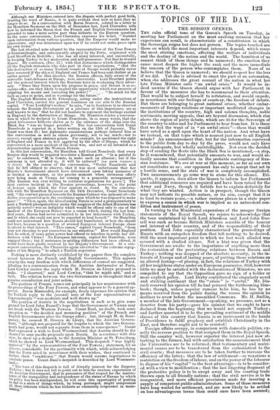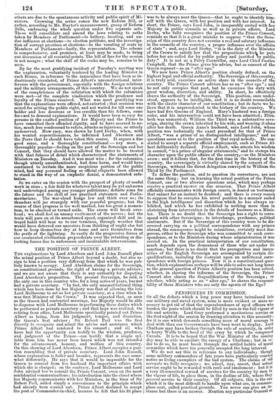TOPICS OF THE DAY.
THE SESSION OPENED.
THE calm official tone of the Queen's Speech on Tuesday, in meeting her Parliament on the most exciting occasion that her experience can recall, is characteristic of a constitution in which the Sovereign reigns but does not govern. The topics touched are those on which the most important interests depend, which rouse the most stirring emotions, affecting the welfare of individuals and the destiny of the nation and the world. The humblest of us cannot think of these things and be unmoved ; the emotion they cause must deepen the higher the rank and the more immediate the concern of the person who contemplates them. None of us believe that the Queen is unmoved ; we should respect her the less if we did. Yet she is advised to enact the part of an automaton, when she addresses the great council of the nation in what her late Prime Minister calls "an awful crisis." It would be in- deed unwise if the Queen should argue with her Parliament in favour of the measures she has to recommend to their attention. That would be to subject herself to refutation, and would impede, in accordance with our feelings of courtesy, the freedom of debate. But there are belonging to great national crises, whether embar- rassments of foreign relations or important meditated changes in the institutions of the country, high and solemn thoughts, noble sentiments, moving appeals, that are beyond discussion, which rise above the region of party debate, which are fit for the Sovereign of the country to utter and for Parliament to hear from her. It is these that we feel the want of in "an awful crisis "—these that would have acted as a spell upon the heart of the nation. And what have we instead, on that topic which is nearest just now to all English minde ? An announcement that, but for the information conveyed to the public from day to day by the press, would not only have been inadequate, but wholly unintelligible. Not even the decided step of sending the fleets into the Black Sea is mentioned,—a step, be it remembered, that potentially amounts to war, and would ac- tually assume that condition in the probable contingency of Rus- sian resistance. We are at war at this moment, so far as our own act constitutes us so ; our opponent has only to accept that act in a hostile sense, and the state of war is completely accomplished. Two announcements go some way to atone for this silence. Eti- quette, it appears, does allow the Queen to inform her Parliament that additional resources are required and have been raised for the Army and Navy, though it forbids her to explain definitely for what they are wanted. Action is in prospect, though the Queen may not indicate its possible nature, or its aim, except that it is to tend to restore peace,—a rather curious phrase in a state paper to express a course in which war is iffiplied as an antecedent con- dition and instrument of peace.
In turning to the Ministerial expansions of the meagre foreign statements of the Royal Speech, we rejoice to acknowledge that the tone maintained by both Lord Aberdeen and Lord John Rus- sell was such as became British Ministers sensible of the honour and interest of their country, and of the responsibility of their position. Dord John especially characterized the proceedings of Russia with an outspoken freedom that left nothing to be desired. Still the most important point to which we last week alluded was covered with a studied silence. Not a hint was given that the Government are awake to the importance of anything more than the restoration of the preexisting relations between Russia and Turkey; nothing was dropped of the absolute necessity, in the in- terests of Europe and of lasting peace, of putting those relations on an altered footing—of placing, in fact, the relations of Turkey with all her neighbour states under an European guarantee. Still, however little we may be satisfied with the declarations of Ministers, we are compelled to say that the Opposition gave no sign of a bolder or more explicit policy. Lord Derby contributed the singularly novel and striking sentiment that the " crisis " is "awful." Mr. Dis- raeli reserved his opinion till he had perused the forthcoming blue- book ; though, unless popular rumour belie him, he has by no means reserved from the public during the recess the opinion he declines to avow before the assembled Commons. Mr. H. Baillie, a member of the late Government—speaking, we presume, not as a deserter from his party—gave his opinion that we ought to have declared from the beginning that we would not support Turkey; and further asserted it to be the prevailing sentiment of the middle classes of this country that Russia is an instrument in the hands of Providence to fulfil prophecy and establish Christianity in the East, and therefore ought not to be resisted!
Foreign affairs occupy, in comparison with domestic politics, ex- actly the reverse position to that assigned them in the Royal Speech. Still the country will, however superior the interest just now at- taching to the former, hail with satisfaction the announcement that the Universities are to be reformed; that testamentary and matri- monial causes are to be transferred from the ecclesiastical to the civil courts ; that measures are to be taken further to increase the efficiency of the latter; that the law of settlement—so vexations a restriction on the freedom of labour, and on the power of the labourer to dispose of his "capital" to the best advantage—is to be consider- ed with a view to modification ; that the last lingering fragment of the protective policy is to be swept away and the coasting trade thrown open to all friendly nations ; that the civil service is.to be reorganized, and more efficient provisions made for insuring a supply of competent public administrators. Some of these measures have long waited for settlement, and are now likely to be settled on less advantageous terms than could once have been secured;
others are due to the spontaneous activity and public spirit of Mi- nisters. Crowning the series comes the new Reform Bill, or rather, according to Mr. Hay ter's announcement, group of Reform Bills, embracing the whole question under five separate acts. These will consolidate and amend the laws relating to oaths -taken by Members of Parliament—to bribery, treating, and un- due influence at elections—to election petitions, and the investiga- tion of corrupt practices at elections—to the vacating of seats by Members of Parliament—lastly, the representation. The scheme is comprehensive, and promises, at least may be made to bring out discussion of all essential points. The bill of fare for the session is not meagre ; what the skill of the cooks may be, remains to be seen.
By far the most gratifying incident of Tuesday's meeting was the explanation, voluntarily tendered by the leading Minister in each House, in reference to the innuendoes that have been so in- dustriously circulated, of Prince Albert's unconstitutional inter- ference with the government, especially with the foreign relations and the military arrangements, of this country. We do not speak of the completeness of the refutation with which the calumnies were met—of the complete vindication which the prudence and loyalty of the Prince received. -What was most gratifying was that the explanations were offered, not extorted ; that occasion was seized for setting the public right, and not waited for till some one bolder and less decorous or less sensible than his fellows, came fore ard to demand explanations. It would have been so easy for persons in the exalted position of her Majesty and the Prince to have consulted their offended dignity, and to have scorned to no- tice, much less condescend to refute, attacks so injurious, so utterly undeserved. How easy, was shown by Lord Derby, when, with his wonted superciliousness, he informed Lord Aberdeen and the Peers that he should have taken this course. It argues a fine good sense, and a thoroughly constitutional — nay more' a thoroughly popular—feeling on the part of the Sovereign and her Consort, that they should have allowed the matter to be treated with that fulness of detail which characterized the statements of Ministers on Tuesdays And it was most wise ; for the calumnies, though utterly unauthenticated, had done harm, and would have continued to irritate the more suspicious portion of the public mind, had any personal feeling or official etiquette been allowed to stand in the Way of an emphatic denial, a demonstrated refu- tation.
So we enter on the session with the prospect of plenty of useful work in store ; a fair field for whatever talent may lie yet unknown and undeveloped among our younger politicians; definite aims for the labour and the skill of our practised statesmen and Parlia- mentarians. The war-cloud bangs low and thick over us; its thunders will jar strangely with our peaceful progress; but the course of that progress is too well marked, has too great a momen- tum, to be checked or turned aside. The storm will break over- head; we shall feel an uneasy excitement of the nerves ; but the train will pass on at its accustomed speed, organized skill and in- trepid habit will bear us to our terminus, through 'weather that would have deterred our ancestors from thinking of ought else but how to keep themselves dry at home and save thenrselves from the perils of the lightning. So vastly do the progressive forces of our accelerated civilization preponderate over the retarding or dis- turbing forces due to unforeseen and incalculable interventions.



































 Previous page
Previous page